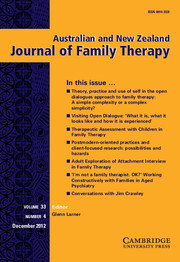Crossref Citations
This article has been cited by the following publications. This list is generated based on data provided by
Crossref.
Brown, Jac
and
James, Kerrie
2014.
Therapeutic Responses to Domestic Violence in Australia: A History of Controversies.
Australian and New Zealand Journal of Family Therapy,
Vol. 35,
Issue. 2,
p.
169.
Brasfield, Rebecca
2014.
The absence of evidence is not the evidence of absence: The abusive personality as a disordered mental state.
Aggression and Violent Behavior,
Vol. 19,
Issue. 5,
p.
515.
Kilgore, Christopher D.
Cronley, Courtney
and
Lehmann, Peter
2015.
Social Construction of Intimate Partner Violence: A Brief Report on Quantitative Grammatical Analysis.
Journal of Aggression, Maltreatment & Trauma,
Vol. 24,
Issue. 10,
p.
1123.
Fidan, Ahmet
and
Bui, Hoan N.
2016.
Intimate Partner Violence Against Women in Zimbabwe.
Violence Against Women,
Vol. 22,
Issue. 9,
p.
1075.
Leggett, Angela
2017.
Online Civic Engagement and the Anti-domestic Violence Movement in China: Shifting Norms and Influencing Law.
VOLUNTAS: International Journal of Voluntary and Nonprofit Organizations,
Vol. 28,
Issue. 5,
p.
2251.
Capistrano, Robert Charles
and
Bernardo, Maria Aurora Correa
2018.
Mother knows best: exploring the matrilineal influence in family tourism among Filipinos living in New Zealand.
Young Consumers,
Vol. 19,
Issue. 2,
p.
218.
Ibrahim, Nada
2019.
Working With Muslim Clients in the Helping Professions.
p.
155.
Kilgore, Christopher D.
Lehmann, Peter
and
Voth Schrag, Rachel
2019.
Discourse After a Batterer Intervention Program: A Qualitative Analysis of “Letters From the Future”.
Violence Against Women,
Vol. 25,
Issue. 5,
p.
593.
Peterie, Michelle
Bielefeld, Shelley
Marston, Greg
Mendes, Philip
and
Humpage, Louise
2020.
Compulsory income management: Combatting or compounding the underlying causes of homelessness?.
Australian Journal of Social Issues,
Vol. 55,
Issue. 1,
p.
61.
Tietje, Adam D.
2021.
War, Masculinity, and the Ambiguity of Care.
Pastoral Psychology,
Vol. 70,
Issue. 1,
p.
1.
Karim, Rabiul
Rahman, Hafijur
Rahman, Suchona
Habib, Tanzima Zohra
Swahnberg, Katarina
and
Schwab-Reese, Laura
2021.
Gender differences in marital violence: A cross-ethnic study among Bengali, Garo, and Santal communities in rural Bangladesh.
PLOS ONE,
Vol. 16,
Issue. 5,
p.
e0251574.
Noor, Muhammad Naveed
2021.
Homeless Youth of Pakistan.
p.
7.
Villoria Hernani, Emmanuel
2022.
Interpersonal Relationships.
Buiten, Denise
2022.
Familicide, Gender and the Media.
p.
43.
Abashidze, Aslan Kh.
and
Goncharenko, Olga K.
2022.
Smart Technologies for the Digitisation of Industry: Entrepreneurial Environment.
Vol. 254,
Issue. ,
p.
179.
Ibrahim, Nada
2022.
Research Anthology on Child and Domestic Abuse and Its Prevention.
p.
91.
Kariuki, L. W.
and
Jansen van Rensburg, S. K.
2022.
Towards Dismantling Patriarchy in the Kibera Slum, Kenya: Narrative Accounts of Victims of Intimate Partner Violence.
International Annals of Criminology,
Vol. 60,
Issue. 1,
p.
99.
Bamidele-Nelly, Nifemi
and
Sotunsa, Mobolanle
2024.
Gender and Leadership in Nigeria and Ghana.
p.
19.
Eyraud, Fiona
Casini, Annalisa
and
Klein, Olivier
2024.
Les croyances à propos de la violence conjugale : des stéréotypes sexistes à l’utopie lesbienne.
The Tocqueville Review,
Vol. 45,
Issue. 2,
p.
125.
Jung, Sohee
Boehme, Hunter M.
and
Kaminski, Robert J.
2024.
An Integrated Test of Power-Control Theory by Delinquency Types: Assessing Additional Factors Predicting Adolescents’ Risk-taking Preferences.
Crime & Delinquency,


